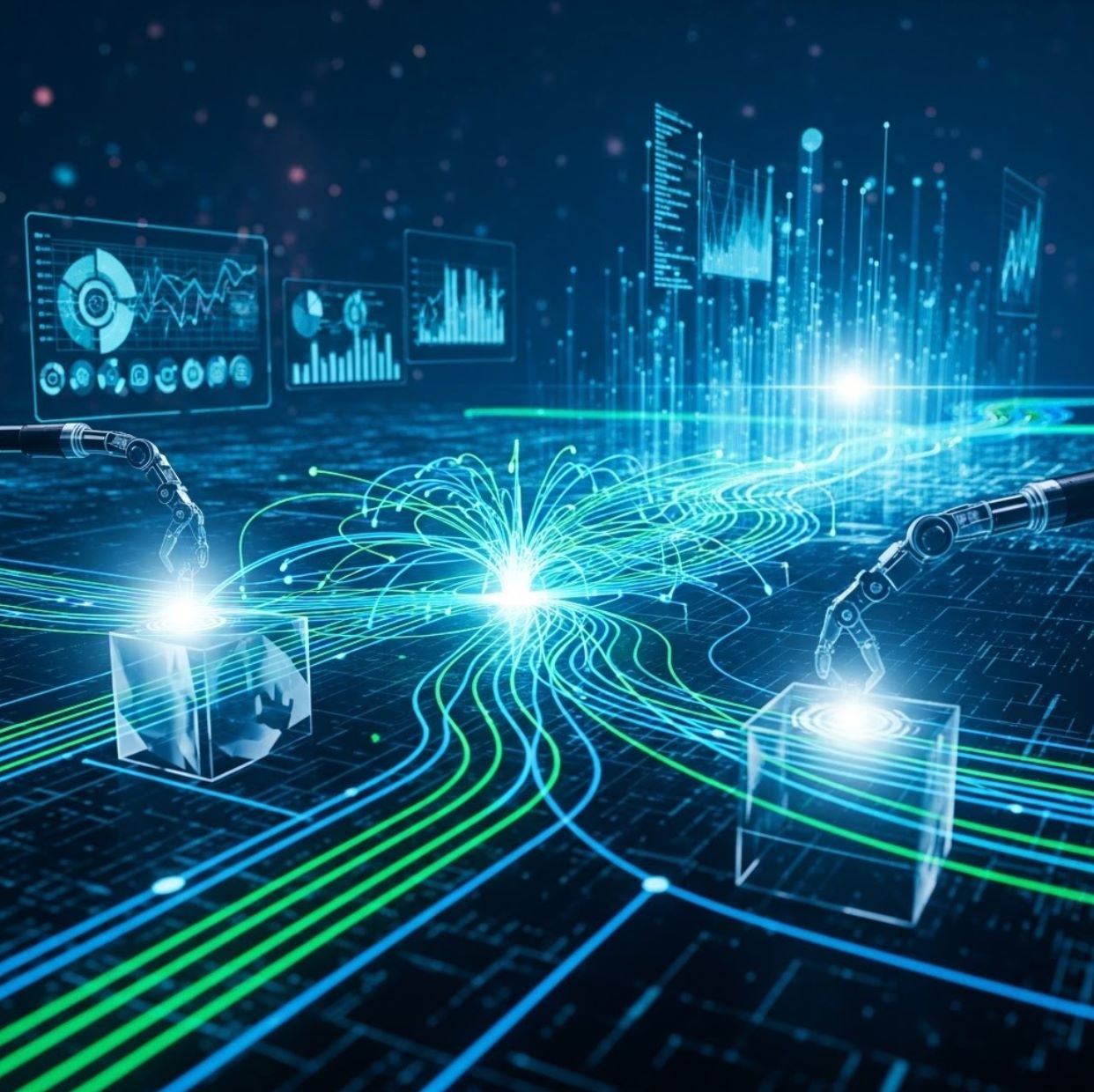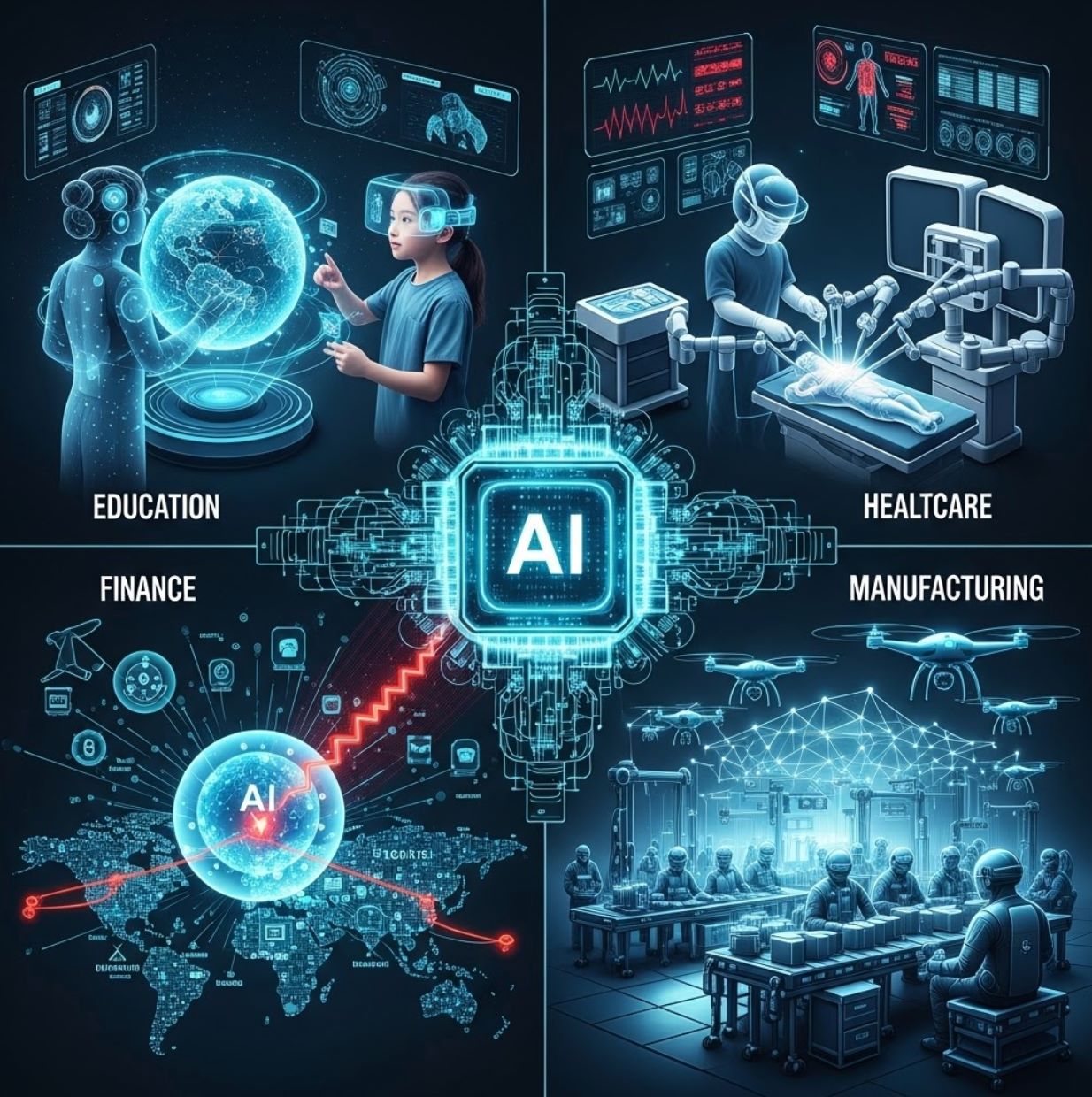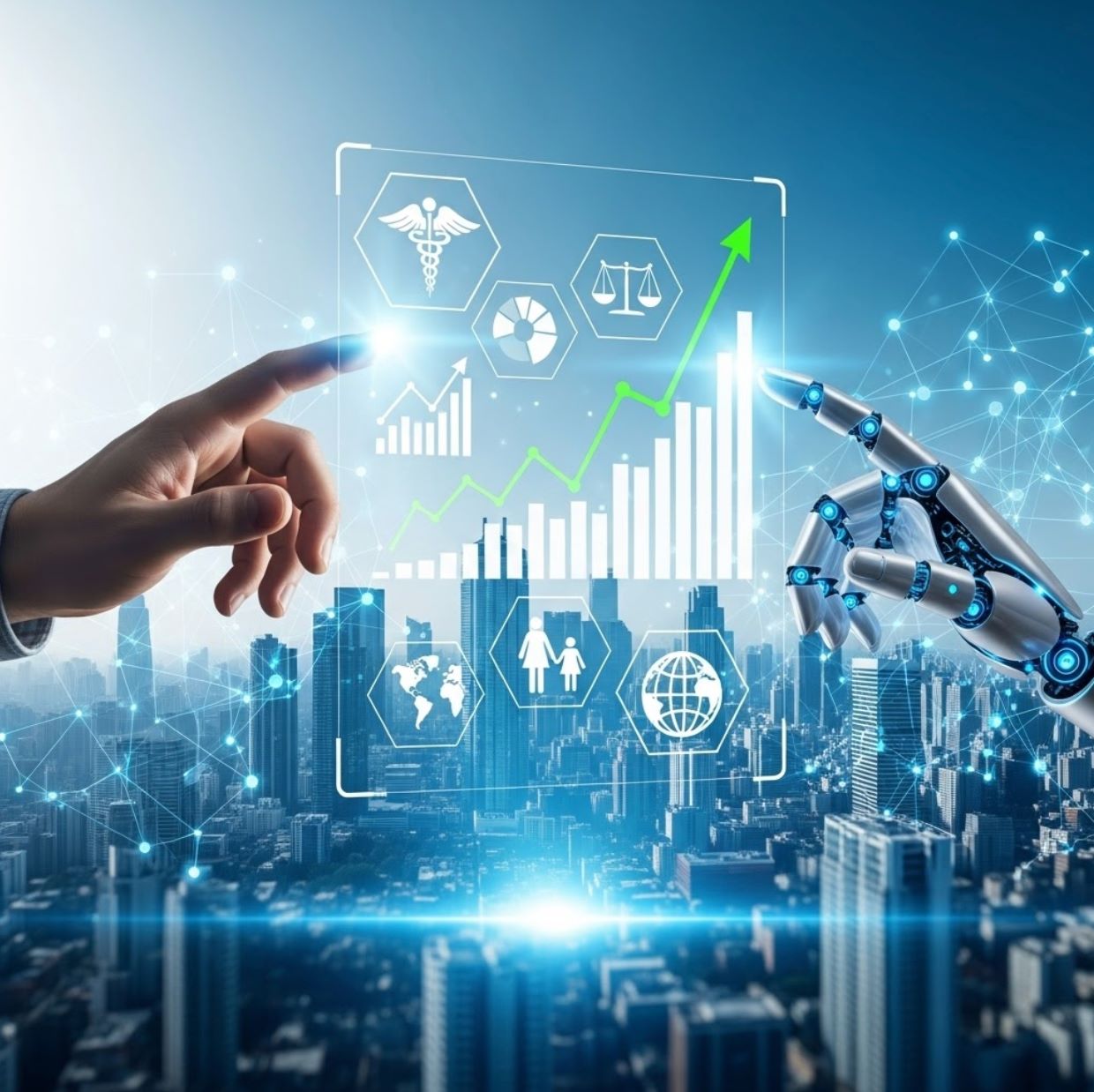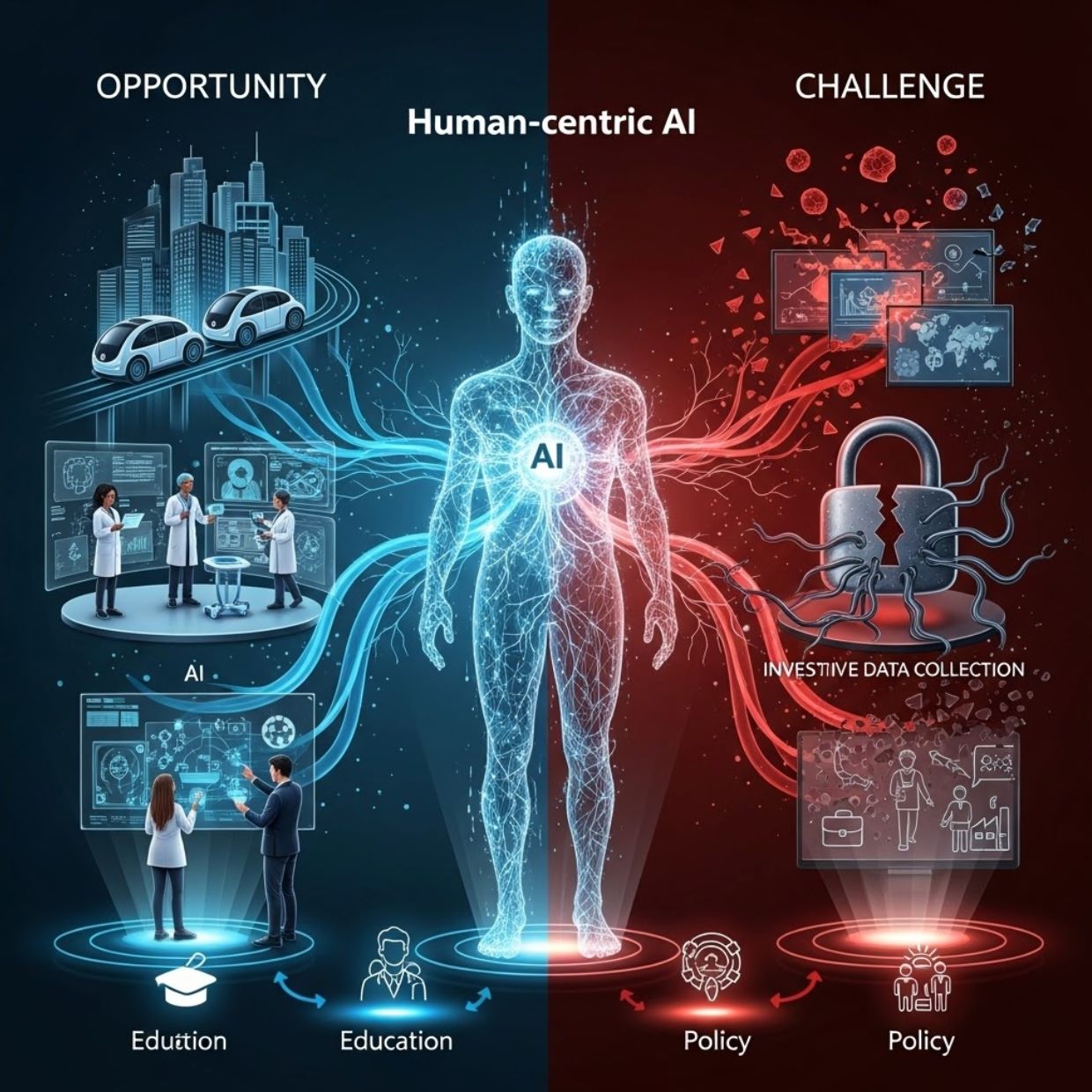The role of AI in the digital age
In the context of an increasingly digital society, AI is no longer an option but a necessity for individuals, businesses, or nations aiming for sustainable development and adaptation to the era. AI provides powerful analytics and automation capabilities while driving innovation across all fields.
What is the role of AI in the digital age? Want to know more? Let's explore deeper with INVIAI in this article!
In the digital age, artificial intelligence (AI) has become the central driving force behind every industry. AI enables machines to analyze massive amounts of data, learn, and predict trends, thereby making fast and accurate decisions.
This technology not only automates processes and reduces manual work but also personalizes services, enhancing user experience. On a national scale, AI is not just a support tool but is regarded as a key partner in production and innovation, helping reshape how society operates.
AI drives digital transformation and innovation
AI is a crucial factor in digital transformation – the comprehensive restructuring of operational and management methods using digital technology. Thanks to its ability to process Big Data and machine learning, AI helps businesses and government agencies automate processes, shorten processing times, and improve efficiency.
Notably, AI also opens up new business models and smart services (such as personalized e-commerce and automated financial applications) that were previously unavailable. As a result, AI helps businesses quickly adapt to the digital market, creating sustainable competitive advantages.

Applications of AI across sectors
Education
AI is transforming traditional teaching and learning methods. AI-powered smart learning systems can analyze student performance, suggest personalized learning paths, and adjust content to suit individual abilities.
Personalized Learning
AI analyzes student performance and creates customized learning paths.
Virtual Assistance
Chatbots help teachers grade assignments and answer student questions instantly.
Virtual assistants and chatbots help teachers grade assignments, quickly answer questions, and analyze student data to detect early signs of falling behind. This enables students to access knowledge more effectively and allows teachers to save time organizing lessons.
Healthcare
In healthcare, AI brings breakthrough improvements. Computer vision algorithms assist in diagnosing medical images (X-rays, MRIs) with high accuracy, detecting many diseases early that are difficult for the human eye to recognize.
- Medical image diagnosis with high accuracy
- Early disease detection capabilities
- Real-time epidemic prediction
- 24/7 remote health consultation services
AI also supports epidemic prediction by analyzing real-time data from multiple sources and provides 24/7 remote health consultation services (medical chatbots) for the public. This allows patients to access timely and effective healthcare services, reducing the burden on hospitals.
Finance & Banking
AI is transforming the financial sector profoundly. Intelligent systems continuously analyze transactions to detect signs of fraud in real time. At the same time, AI personalizes financial services, such as recommending insurance packages or smart investment plans based on customers' habits and financial history.
Fraud Detection
Personalized Services
24/7 Support
AI chatbots provide 24/7 customer support, increasing satisfaction and reducing pressure on staff. Thanks to AI, banks and financial companies can serve customers more flexibly and manage risks more effectively.
Industry & Manufacturing
In manufacturing, AI combined with the Internet of Things (IoT) and automation creates "smart manufacturing." AI-controlled robots operate precisely on production lines, increasing productivity and reducing errors.
AI also analyzes sensor data to predict equipment failures (predictive maintenance), thereby minimizing unexpected downtime. Supply chain management is also optimized through AI's market demand forecasting and smart goods coordination. Thanks to AI, the industrial sector can achieve high automation, improve product quality, and enhance competitiveness.
Other Sectors
Additionally, AI is spreading strongly into agriculture (crop monitoring, pest outbreak prediction), entertainment (content recommendations, scheduling game/film production), transportation (self-driving cars, route optimization), and many other fields.
- Agriculture: Smart irrigation management and harvest forecasting using sensors and machine learning
- Entertainment: Personalized content recommendations and production scheduling optimization
- Transportation: Autonomous vehicles and intelligent route optimization systems
- Environmental: Climate monitoring and pollution prediction systems
For example, AI helps farmers manage smart irrigation and forecast harvests using sensors and machine learning algorithms. In summary, AI is widely applied across all sectors to improve efficiency and bring convenience to life.

Economic and social benefits of AI
AI offers many outstanding advantages for the economy and society. The transformative power of artificial intelligence extends far beyond simple automation, creating fundamental shifts in how we work, live, and interact.
Increased Productivity
Data-Driven Insights
Enhanced User Experience
New Business Models
National Development Impact
- Driving growth: Leading countries worldwide are heavily investing in AI because it boosts competitiveness and sustainable growth. Vietnam has also issued a National AI Strategy through 2030, aiming to be among the top 50 AI countries by building digital infrastructure, opening data, and training high-quality human resources.
- Enhancing competitiveness: AI not only helps businesses increase profits but also contributes to modernizing administration and improving quality of life. According to VLU, AI supports modernizing state apparatus and environmental protection, contributing to better living standards.
- Human-AI collaboration: In the AI era, humans still play a vital role but are strongly supported. Workers collaborate with AI to solve complex problems, from strategic planning to technical operations.
With AI, agencies can formulate policies based on accurate data and support citizens' fast interactions via digital platforms. Experts emphasize that workers collaborate with AI to solve complex problems, from strategic planning to technical operations.

Opportunities and challenges
Artificial intelligence opens many opportunities but also presents significant challenges that require careful consideration and strategic planning.
Growth Potential
- Automate and optimize processes across industries
- Create innovative products and services
- Solve complex social issues (telemedicine, smart transportation)
- Drive economic growth and competitiveness
- Transform work environment toward higher-skilled jobs
Critical Concerns
- Data Quality Requirements: Large amounts of accurate data needed for model training
- Ethical and Privacy Issues: Concerns about large-scale personal data collection and processing
- Employment Displacement: Automation may cause unemployment in traditional sectors
- Algorithm Dependence: Risk of serious consequences from biased training data
Strategic Solutions
Smart Management Policies
Develop comprehensive legal frameworks for data protection and ethical AI use.
Human-Centered Development
Ensure AI serves as a supportive tool that enhances human capabilities rather than replacing them.
Digital Workforce Training
Increase investment in STEM education to equip citizens with digital skills for AI collaboration.
To address these challenges, smart management policies, legal frameworks for data protection, and digital workforce training are essential. AI technology must be developed alongside the principle of "human-centeredness," ensuring AI is a supportive tool that enhances human capabilities.
Meanwhile, businesses and governments need to increase investment in STEM education to equip citizens with digital skills for effective collaboration with AI.

AI provides powerful analytics and automation capabilities while driving innovation across all fields. The transformative impact of artificial intelligence extends beyond simple technological advancement – it represents a fundamental shift in how we approach problem-solving, decision-making, and value creation.
Therefore, every individual and organization needs to proactively approach and master AI today to avoid falling behind and contribute to building a smarter, more efficient, and humane digital society.







No comments yet. Be the first to comment!